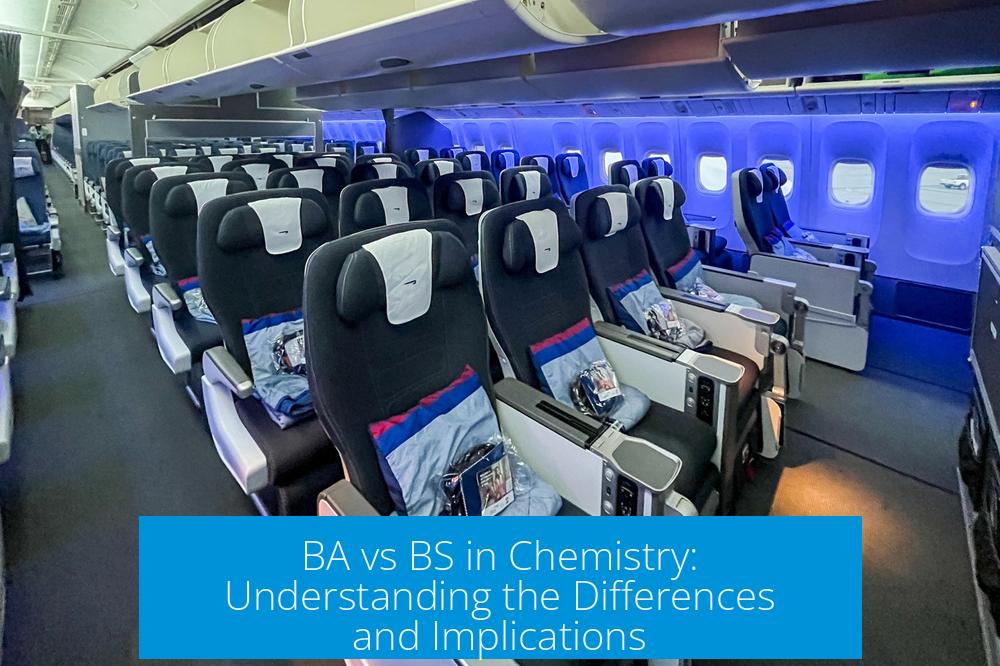BA vs BS in Chemistry: Understanding the Differences and Implications

The main difference between a Bachelor of Arts (BA) and a Bachelor of Science (BS) in chemistry lies in the program focus: BS degrees emphasize scientific and technical coursework, often including more lab work and research, while BA degrees typically offer more flexibility with a liberal arts approach. Despite this distinction, in many cases, the degree title alone does not significantly affect employment or graduate school opportunities if supplemented with research experience and strong recommendations.
General Perception of BA vs BS Degrees in Chemistry
Many employers and graduate programs recognize both BA and BS degrees in chemistry. The distinction between the two often becomes negligible when evaluating candidates. Most employers see “Bachelor’s in Chemistry” on resumes without scrutinizing the BA or BS label. For instance, individuals with BA degrees have secured positions in industry and top graduate schools, reflecting that the degree title does not heavily influence outcomes.
Admissions committees and hiring managers prioritize research experience, GPA, and recommendation letters over whether a candidate holds a BA or BS degree. One common observation is that after the first job, the degree label matters less. Work experience and proven skills become the primary criteria for career advancement.
The Role of Research Experience in Chemistry Degrees
Research experience is critical to improving graduate school admission prospects and employability in chemistry-related roles. While the BS program often mandates research or lab internships, some BA programs may lack this component. Missing research exposure can be a disadvantage.
- A semester or more of undergraduate research provides hands-on skills and chemistry bench competence.
- Employers in industrial and laboratory settings prefer candidates with demonstrable laboratory research experience.
- Having conducted research or completed a senior thesis can significantly differentiate a candidate from others, especially new graduates.
Some companies explicitly prefer BS holders for process chemistry or R&D roles, associating the BS curriculum with stronger laboratory training. However, BA graduates with research experience have still achieved success in these areas.
Employment Opportunities and Industry Preferences
The perception of BS degrees as more suitable for industrial jobs is common. Many job postings specify a BS degree requirement. This often reflects the expected rigorous science background and lab readiness the BS education suggests.
Despite this, a BA degree does not exclude a candidate from consideration. Applicants may still be hired for positions even if the job posting lists BS as a preferred degree. Exceptions exist where some companies reject BA degrees outright for specialized roles.
In roles requiring practical laboratory skills, a BS degree opens more doors, especially at the start of a career. However, this preference declines with time as employers focus more on work performance and experience rather than degree specifics.
Choosing Between BA and BS Based on Career Goals
Career goals play a decisive role in selecting between a BA and BS.
- Graduate school or research-intensive careers: BS degrees with strong lab components better prepare students for advanced scientific study.
- Industry roles with lab work: BS degrees tend to facilitate easier entry into these sectors.
- Non-chemistry careers or interdisciplinary fields: BA degrees allow more flexibility, suitable for careers such as science writing or teaching.
Some students may face the decision of spending an extra semester to complete BS requirements. One must weigh the potential long-term benefits against the time and cost of additional study.
Academic and Certification Aspects
American Chemical Society (ACS) certification often aligns with BS degrees, especially those following ACS curriculum guidelines. Such certification signals rigorous training and may improve prospects for challenging lab roles and academic progression.
However, opinions differ on ACS certification’s sufficiency for all chemistry paths. Some consider the math requirements in ACS-certified programs insufficient for physical chemistry graduate work. The label of ACS certification is most valuable when it reflects comprehensive preparation across chemistry disciplines.
Anecdotal Evidence and Career Success
Many BA chemistry graduates report successful careers in research, industry, and graduate programs. Experiences vary, but consistent themes emerge:
- Strong GPA and research work bolster graduate school acceptance and job offers.
- Grad schools frequently prioritize letters of recommendation and lab experience over the degree title.
- Some schools only offer BA degrees, and graduates from these programs still secure scientific roles.
- Work ethic and continuous skill development matter more over time than BA or BS distinctions.
Additional Considerations and Advice
The labeling of a degree as BA or BS often depends on institutional traditions rather than content alone. Employers may be biased toward BS degrees, although this bias is not universally justified.
Gaining internships, summer research, or work-related experience compensates for any perceived shortcomings of a BA degree. Developing skills, collaborating professionally, and demonstrating competency matter most.
Key Takeaways
- The BA vs BS distinction mainly reflects differing academic emphases, not a strict measure of competence.
- Research experience is critical and often outweighs the impact of the degree type.
- BS degrees facilitate easier access to lab-intensive jobs and graduate study but do not exclude BA graduates with strong records.
- Long-term career success depends primarily on work experience, skills, and recommendations rather than degree title.
- Students should choose their degree based on career goals and opportunities for research involvement.
What is the main difference between a BA and a BS in chemistry?
The BS often includes more lab and research work. The BA usually offers a broader liberal arts education. Employers and grad schools mostly focus on your skills and experience rather than the degree title.
Does having a BA limit job opportunities in chemistry?
Not necessarily. Some companies prefer BS degrees, especially for lab roles. However, many employers hire BA graduates if they have research experience or work history.
How important is undergraduate research for chemistry careers?
Research experience greatly improves hireability. It shows practical skills and competence. Missing research could limit some job options, but it’s not a strict barrier.
Will graduate schools accept a BA in chemistry?
Yes. Admissions usually care more about research, grades, and recommendations. A BA with solid research can get you into top programs.
Should career goals influence choosing a BA or BS?
Definitely. If you want to work in labs or pursue grad school, a BS might help. For jobs outside chemistry or writing, a BA can suffice.
Does holding an ACS-certified degree matter?
ACS certification signals a solid curriculum for lab work and advancement. Still, some say it doesn’t fully prepare students for all chemistry fields, especially physical chemistry.





Leave a Comment